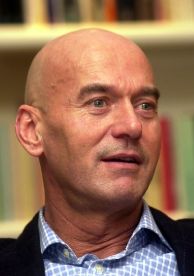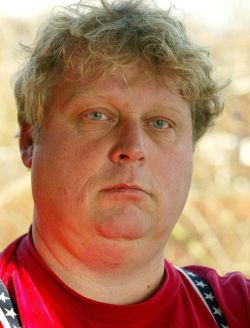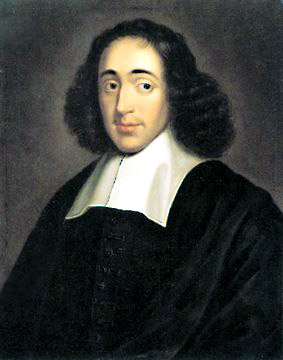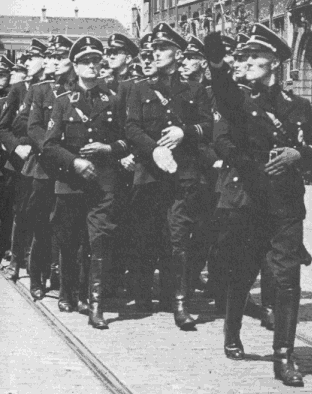
Pim Fortuyn — the regents of Holland do not murder their critics — they simply withhold their protection and let others do the job
| THINK-ISRAEL |
| HOME | March-April 2010 Featured Stories | Background Information | News On The Web |
If you like to think of Holland as the cradle of free speech and the
Enlightenment, don't read this article.
'Nobody needs permission beforehand to publish by print thoughts or feelings — while taking into consideration every person's responsibility according to the law.' (Article 7, Dutch Constitution)
Again the ruthless reflex sets in. Because that lies at the core of our Dutch character: the social annihilation of the deviating individual — including a neat political murder, every now and then (we never go after a group, that is not done after our very active partaking in the Holocaust).
The latest news on the chronicle of the death foretold of right wing parliamentarian Geert Wilders, infamous for his bleached haircut from outer space, is that the CEOs of Dutch multinationals fear loss of profit because of Fitna. The Movie. Wilders gained notoriety because of his wish to ban the Koran and his severe criticism of islam in comparison with "our shared Dutch heritage of Humanism and Enlightenment, as it was successfully proclaimed by our highly esteemed Spinoza". The captains of industry state that Wilders' movie will prove too critical and, hence, will harm their age-old connections and business in the Arabic world and Indonesia (a former Dutch colony). The highly successful and erudite lawyer Gerard Spong, a very nice fellow from Surinam (independent in 1975), is hired to sue Wilders: "For irresponsibly damaging Dutch interests". It almost goes without saying that many of these directors, managers and members of the board have been key members of the public service, previous Cabinets included, or will be in future times. The Union of IT Businessmen In The East (FME) strongly seconds their concern: "The real problem is that Wilders' movie fits a pattern of confrontation: the Danish cartoons; the war in Iraq. The movie might prove to be the straw that breaks the camel's back" (Intermediair 11, 13 March 2008). "Wilders, don't do it!" prays Bernard Wientjes, the chairman of the VNO-NCW (Union of Dutch Business). "Surely you know that when it really counts the reverend is always traded for the businessman" (The Volkskrant, 15 March 2008).
Also, the Dutch media, via their coordinating National Broadcast Institute, the NOS, issued a shared statement that they will not air Wilders' movie "because of fear of attacks and not to give this irresponsible person a platform for his xenophobia". The news agency of the Dutch Parliament (Nieuwspoort) will not provide Wilders with the possibility of showing his movie, because "the making of movies is not part of a parliamentarian's work". (The head of the NOS is always a former cabinet member.) Not surprisingly the Socialist, Christian and Liberal parties backed this blocking of Wilders (The Volkskrant, 15 March 2008).
Our current Cabinet, headed by prime minister Balkenende, put even more pressure on Wilders not to show Fitna. Seeking support from France and other EU members, Balkenende made it quite clear that "unfortunately we cannot censure the movie of Mr. Wilders beforehand, but we strongly advise him to reconsider for reasons of State Security". Also he asked EU understanding for Wilders' "silly behaviour, for which damaging consequences he and he alone will be held responsible". Also, the Cabinet demanded complete transparency of Wilders' financial situation and of his political movement, the PVV (nine seats in Parliament) — even though this is not demanded by law (ANP News Organisation, 16 March 2008). Hans van den Broek, former minister of Foreign Affairs in three Christian cabinets during the 1990s and currently Member of the State Council — the most prestigious body of advisors of Parliament and Cabinet and directly appointed by the Crown — is significantly less scrupulous: "I understand that the Prime Minister thinks that his hands are tied, but nevertheless I most strongly advise him to stop Mr. Wilders by every means available, including total censorship, because the interests of the State, politically and economically, are in the greatest danger" (NOS TV interview, 26 March 2008).
Still, Prime Minister Balkenende's statement lacked nothing in clarity: If they come for you, you're on your own. You are fully responsible for the effects you cause. You'll have to rely on your bodyguards, we will not protect you.
These last few weeks my foreign friends have called and asked me: "What the hell is going on in the Netherlands? How is it possible that so many Dutch politicians favour censorship and lawsuits, and that leading men of opinion openly and repeatedly compare Wilders to Goebbels and Hitler? How is this possible with your tradition of Spinoza?"
They didn't like my answer. Nobody likes their academic wet dreams about the 17th century cradle of Enlightenment and Freedom to be disturbed.

Pim Fortuyn — the regents of Holland do not murder their critics — they simply withhold their protection and let others do the job
The public comparison of a well known individual with Hitler, Mussolini or Mussert (leading Dutch Nazi collaborator) and the removing of the social safety net belongs to an ingrained Dutch tradition, well known to the Dutch. If you're judged too harmful to the Dutch State, Culture and/or its Business (and these three are highly intertwined), the ruthless reflex sets in and it's game over — including, sometimes, death. Recently the world was able to witness this flaw in our character: Pim Fortuyn, "fascist" adversary of the Left and winner of the elections, was murdered in 2002; Theo van Gogh, "racist" mocker of muslims, jews and the Left, was murdered in 2004; Ayaan Hirsi Ali, "heretic" critic of the Left and of islam, was effectively banished in 2006.
Tellingly, all four of them, if you include Wilders, used 'Spinoza' as their buzz word — it was his Enlightenment ideals against those of the attackers of western freedom. Fortuyn, Hirsi Ali and Wilders mainly opposed orthodox islam, Van Gogh mainly wrote against the naive fool who hands his freedom over out of laziness and decadence. They were not shot or deported by the State. The elite merely closed its ranks and left them alone, unprotected. In regard to the murder of van Gogh the director and staff of the Dutch Security Agency largely knew what was going on and what was about to happen (Mohammed Bouyeri, the murderer of Theo van Gogh, had even been their informant for a few months), but nevertheless decided to remain passive. On Tuesday the 16th of March 2008 the Dutch Minister of Internal Affairs, Mrs. G. Ter Horst had to admit this fact in Parliament after the publication of the "Van Gogh report" by The State Commission for Controlling the Dutch Security Agency (the CTIVD).

Theo van Gogh — Dutch Security largely knew what was going to happen but decided to remain passive
A less known recent example of State bullying is also highly telling: The journalist and writer Willem Oltmans, mocker of the monarchy (never do that!), the establishment and Dutch industry, was put out of work, any work, by successive Dutch governments for a period of 25 years, starting in 1971. After being a Don Quijote for years he finally had his day in court. The State was forced to pay him 5 million euro. Which they stalled for years in the hope he'd die of old age. He gracefully refused to do so, however, and at the age of 75 collected his cash and bought his longed for piano.
These examples of state terrorism are sanctioned by Dutch mentality: 'if you stick out your head too often, we'll chop it off'. Also, the Dutch Constitution's Article 7 on the Freedom of Expression was not written with John Stuart Mill's On Liberty in mind. Mill preached total freedom of speech because "even a raving madman might say something sound". In Holland this position is only defended by some philosophers of the University of Amsterdam. Philosophy professor Pieter Pekelharing (University of Amsterdam) is a bit of a loner when he states that: "Geert Wilders is an intolerant fool who nevertheless has every right to say stupid things. Also, we cannot rule out the remote possibility that he is right on the dangers of the islam" (The Volkskrant, 15 March 2008).
Mill's ideas on liberty were never fully incorporated into the Dutch rule of law because the reshuffling of power that took place in 1848, and which in the following decades led to our present parliamentary system, was mainly intended to check and balance a despotic and incompetent king — and had very little to do with a democratic revolution. The constitution handed power exclusively to a very small group of high-brow, male haves, who were allowed to vote and sit in Parliament because they paid a high amount of taxes (and where of good social standing). The "solution of 1848" decidedly did two things: the King's power was curbed and the growing unrest of the elite ("we pay taxes, but we have no say") was eased. Whatever happened later on — the first political parties after the 1880s, men's general vote in 1917, women's vote in 1919, and so on — was never the intention. On the contrary the constitution was intended to curb freedom, and we are now stuck with it, mentally and legally.
The pattern of merely practical and opportunistic tolerance, and never absolute freedom, was already prevalent in the 17th century Dutch Republic's "Golden Age". Sure, the story goes that Huguenots from France, Jews from Spain and Portugal, Lutherans from the German states, and bored Brits flocked to Amsterdam and Holland because here they were free and tolerated. Descartes, Pascal, Spinoza, Locke, Voltaire — they all found refuge and a printing press. The truth is a bit more grim. The Huguenots, Jews and Germans were welcomed because they were very profitable. The Huguenots brought in cash, the Jews connections and the Germans were excellent cannon fodder. The famous philosophers were often mere puppets on a propaganda string. John Locke's ideas on liberties (never: freedom) was most handy to Calvinist Stadholder William III of Orange in his war against Louis, the Catholic French Sun King, and for his invasion of Great Britain to be crowned King in 1688. That is, after William III had his Dutch critic, Prime Minister (raadspensionaris), the renowned republican, mathematician and philosopher Johan de Witt disembowelled and lynched by the Orangist mob in The Hague.

Johan de Witt — disembowelled by an Orangist mob
The Dutch Republic formally gained independence in 1648. But that was only after fighting a very bloody 80 years long war of terror against Spain. This war can be seen as a truly Darwinian struggle in which hundreds of thousands of people perished, and only the "real believers were saved". From the first gunshots that started it, the Dutch and the Orange dynasty were geared to the Providential realpolitik of power and profit. The Dutch Republic was regarded as the Second Israel and the Dutch saw themselves as Providence's beloved lapdog, which only gave them even more justification to do as they pleased. The high-brow elite of stern Calvinistic regents denied anybody else access to power. The regents and their social milieu were merciless businessmen — only to be compared to the present Mafia. Piracy, blackmail, extortion, assassination, it all belonged to business as usual. And every perverse aspect of business was superbly mastered or invented: the piracy of the international sea trade; the export of war; the speculation with food during famines; the professionalisation of the slave trade to the West; Amsterdam's stock exchange and its international banking; Amsterdam's profitable opium trade with the East; the invention of Amsterdam's prostitution; and the printing and export of illegal books.
In her massive 17th Century Dutch Book Censorship (The Hague 1998) Ingrid Weekhout convincingly shows that censorship on the Dutch was extremely strict. Much more so than censorship on the people of Great Britain. Often writers, printers, booksellers, and buyers were banished or imprisoned for life. Nearly always they were ruined because of the heavy fines. Censorship was applied to every expression that was not in accordance with the interests of the Dutch regents and their politics, the Dutch State Church that was sponsored by the regents, and the huge colonizing firms such as the West and East Indies Companies, which were privately owned by the same regents. However, the export of books which were censored and banned because of their ideas on atheism, equality or freedom of speech, was sanctioned because the export of banned books was such a powerful propaganda tool against Spain and France. Moreover, it was so profitable. As always this proved to be the winning argument. The regents also used it to defend the murderous slave trade: "Something that is so profitable, cannot be against God's Will."
Writers and scholars were never allowed to go too far. The room for intellectual exploration was strictly fenced and checked. There was controlled tolerance, not freedom of the press. Many historians have wondered about the lack of Dutch policemen during the 17th, 18th and early 19th Century. Only one or two "sheriffs" covered major cities such as Amsterdam or Rotterdam. However, there was hardly any need for this profession: the social net of the Dutch State Church, the regents and their vertical linkage, the municipality, the extended family and the neighbours was inescapable. Nearly always the accused were caught. The every day threat of social annihilation was very real. And there where people like Locke flourished, social and religious critics such as the Koerbagh brothers, unfortunately writing in Dutch, were starved to death in dungeons.
Jonathan Israel in his highly acclaimed Radical
Enlightenment (Oxford 2001) describes in detail the secret and
underground culture of radical rationalists such as Spinoza, Baruch
d'Espinosa (1632-1677), a Jew of Portuguese ancestry.
Baruch Spinoza died before the regents and the King could murder him
They acted too late. Spinoza, as always in very bad health, didn't
need murder to die. His death wrong-footed the people in power. They
thought they were off the hook. But despite ill health Spinoza had
managed to finish his Ethics and to have the manuscript
smuggled out of his house. Over the following decades Spinoza's work
never stopped gaining momentum; and thus helped in creating the myth
of the now much applauded Dutch freedom of the press and of Holland as
the cradle of the Enlightenment.
Of course, over time things got less Calvinist, brute and grim.
Politeness and civility came into fashion. But the Dutch never took
their eyes off the ball: it was all about business interests and
profits. This focus on power and profit was most visible in colonies
such as Surinam and Indonesia. In fact, the single most famous book in
modern Dutch literature, written by Multatuli in the 1880s, hovers
around the theme of an individual, Max Havelaar, who, to his utter
demise, criticised the extremely corrupt government of the colony of
Indonesia. Multatuli barely survived the public outcry he caused.
The cry for control never ceased nor waned. In his erudite
Religious Regimes: Dutch Religion and Society, 1570-1990 (Amsterdam,
1996) Peter van Rooden shows that during the 19th century the
extensive social control even gained in intensity, and that the
interconnection between Church, State and Commerce never faded but
remained largely intact well into the 1970s. The process of ever
increasing social control, which was only temporarily disrupted by the
Second World War, is known under the Dutch term Dutch "verzuiling"
— pillarization. Catholics, Protestants, Socialists and Liberals,
they all had their own "pillar" of vertical linkage and social
cohesion. At the top of the pillar the priests, reverends and party
leaders decided on the formation of the Dutch government. This system
led to "pillarized" schools, universities, radio and television. In
fact, the entirety of Dutch life was highly pillarized and therefore
easy to control. The late 1960s and early 1970s saw the first cracks.
The "permissive society" appeared, but the system did not collapse
until the mid 1980s.
One may well consider the 1990s as a period characterised by a
power vacuum, a moment of uncertainty and chaos, in which power,
again, changed hands from and to influential families, including the
Oranges — who, in the person of the Calvinist Queen Beatrix saved
a very big chunk of it for herself. Mr. Mertens and his researchers
have shown that for centuries the number of powerful families has
stood at ca. 200. Of course, old names have dropped out of sight and
new ones have been added. But the practice of control by a few remains
in place today (Mertens: The 200, The Hague 1968/1998). It is
important to stress that the continuation of the concentration of
power in the hands of the very few is frequently caused by endogamy.
Illustrative are the recent marriages of a daughter of Hans van den
Broek, the aforementioned Member of the State Council, with the third
son of Queen Beatrix, and of a daughter of Laurens-Jan Brinkhorst,
former Minister of Economics, with the second son of Queen Beatrix.
The latter isn't too surprising: Brinkhorst has been Beatrix' lover
for quite a while now.
Because of the unique power vacuum of the 1990s, the four years
from 1998 to 2002 (which not by mere chance coincided with the rise
and fall of Pim Fortuyn and his cry for reform) was the only period in
parliamentary history when Christian parties were not part of the
Cabinet, and the Socialists suddenly found themselves checked and
balanced by the party of Democrats 1966 (D66) — the only party
which was openly atheist and in favour of reform. (D66 dropped these
battle cries after its founder and Minister of Foreign Affairs, Hans
van Mierlo, became a Member of the State Council and the second man in
command, Brinkhorst, married his daughter to the Orange dynasty.) Not
surprisingly the Christian Democrat Party (CDA), regaining power in
2002, coined these years "the time of hedonism and uncontrolled
freedom". During the elections of 2002, 2004 and 2006 Prime Minister
Balkenende vowed "to turn back the clock, and to step away from the
abuse of the freedom of expression which caused so much harm to our
business interests". Balkenende did not attend Theo van Gogh's
funeral, but went to a social gathering of imams in an Amsterdam
mosque instead.
We're not a very nice people. Colonization, slavery, massive Nazi
collaboration, condoning Apartheid, drugs trade: the list is endless,
but quite successfully we have managed to window dress it all. But
it's merely a facade, and we know it. We don't like the way we're
governed. So the only moment ever in Dutch history when our opinion
was asked via a referendum (which was pushed trough parliament by the
party D66), we cried out "NO!!!". First and foremost this was not a no
against the EU, but against the age-old regents system of dividing
power. We're awful people, the ruthless reflex, the Calvinist need for
exclusion, is always lurking in the dark. But there's intense remorse
after committing the ugly sin. Pim Fortuyn received a magnificent
funeral and was suddenly elevated to true philosophic heights. Theo
van Gogh was commemorated with a gigantic statue which portrays a
shouting face that is silenced. And Ayaan Hirsi Ali made sure that her
flight to New York caused the fall of the Cabinet.
Also, the myth of the Dutch 17th century as being the cradle of
Enlightenment and Freedom, and of the present Netherlands as being,
the safe haven of liberty, is a very pleasant fiction. And when things
do not really matter, which is most of the time, it is a story one
could safely believe in. But it's important to realize that even if
the Dutch Republic was the cradle of the Enlightenment, it never was
the place where it was allowed to grow up.
The tragedy of the politician Geert Wilders is mainly threefold.
Somehow along the line he forgot what the Dutch system of power is
meant to accomplish: to protect our business; and keeping very good
relationships with our Islamic partners is apparently our core
business these days. Secondly, Wilders has never heard of "Tony's
third law": "never underestimate the other guy's greed!" (Al Pacino in
the movie Scarface). Pim Fortuyn was left unprotected just at the
moment when he was about to win a massive victory during the 2002
elections. I credit his political opponents with enough Machiavellian
motive not to be too sad about this extremely lucky coincidence. The
fact that Wilders is a member of parliament and part of the
establishment (he used to be a coming man in the Liberal Party (VVD)
but left) infuriates his colleagues even more, and will speed up his
expulsion. Thirdly and ever so sadly, Wilders probably believes the
17th century cradle myth to be true. However, our heritage is not
Spinoza and his professed freedom. Our heritage is Providence,
propaganda and social control: the one who deviates will not go
unpunished. Geert Wilders attacks islam and the Koran from a historic
and philosophic position that never existed. Spinoza was not murdered,
but only because he died in time. I'm not sure if Geert Wilders will
be that lucky.
The author is a Dutch historian educated at the University of
Amsterdam, the EUI in Florence and UC Berkeley. He describes himself
as an independent critic — for as long as it lasts.

Ever increasing control
Not very nice

This article appeared in March 2008 and is archived at
http://www.sappho.dk/why-spinoza-was-not-murdered.htm
HOME
March-April 2010 Featured Stories
Background Information
News On The Web